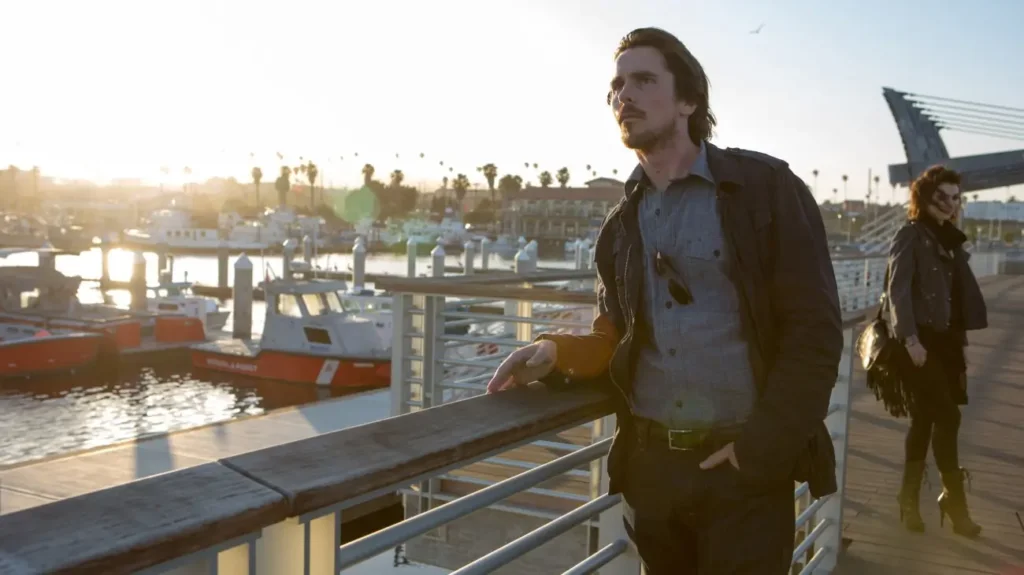KNIGHT OF CUPS. Scattered collage

Terrence Malick is undoubtedly the most romantic and spiritual director of our times. At the same time, however, he also comes across as a self-taught preacher. This is evident right from the start in his seventh film, “Knight of Cups” (2015).
In “Knight of Cups”, the creator of “Days of Heaven” invokes the famous Christian allegory “The Pilgrim’s Progress”, soon followed by a voice-over narration recalling the parable of a young prince, a knight, who is sent by his father to find a precious pearl but loses his memory and forgets the task he was given.
The very title itself hints at mysticism. “Knight of Cups” refers to a tarot card, symbolizing a sensitive, loving person who also struggles with the harshness of reality. Tarot imagery is present throughout the film, which Malick divides into eight chapters, seven of them titled after esoteric tarot cards. In addition to the pervasive spiritualism, the film is suffused with dreaminess and melancholy. This is because Rick (Christian Bale), the main character, is a mirror image of the “card knight.” Despite being wealthy and leading a comfortable life as a screenwriter in Los Angeles, Rick feels an existential emptiness. This can be likened to the previously mentioned parable, where Rick appears as someone who, influenced by others and his surroundings, forgets his higher purpose and leads a hedonistic, empty life.

However, the protagonist eventually wakes up from his stupor.
The film opens with an earthquake, literally. From that moment, the protagonist starts to view reality differently—a reality that Malick disapproves of. At one point, a character says, “We don’t live the lives we were created for. Something else is meant for us.” Shortly after, another character remarks, “You know who was extraordinary? Cleopatra. If her nose had been just a bit shorter, it would have affected the world.” Malick seems to want to believe this and suggests that humanity, as a society, is not in the right place. Nor is Rick. But unlike many others, he is searching for it. These searches are what we observe throughout the film as the protagonist “spins” among beautiful women, each of whom has a personal impact on his inner development. The lost Rick thus appears as a womanizer and playboy, but all of his lovers act as one great teacher, a kind of “meta-woman.”
One of the film’s undeniable strengths is that nearly all six of Rick’s romantic partners bring essential individualism.
There’s the rebellious and angry Della (Imogen Poots), the captivating and fun Karen (Teresa Palmer), and the understanding and warm Nancy (Cate Blanchett). But it’s not just the women. Rick also interacts with his family—his brother (Wes Bentley) and his father (Brian Dennehy). These relationships, however, are not easy and often lead to tension. The voice-over narration, a hallmark of Malick’s style, plays a key role in the film. Through it, we learn, among other things, that one of Rick’s brothers committed suicide and that he left his wife. The story is simple: a lost man searching for meaning in life. The prose of existence in a poetic… or perhaps pretentious… depiction?
Malick continues and expands the style he developed in “The Tree of Life” and “To the Wonder”.
The film’s strongest aspects are its technical elements. Cinematographer Emmanuel Lubezki delivers stunning visuals, at once a pleasant reprise of previous collaborations with the “Badlands” director, while occasionally evoking films by Michael Mann, like “Collateral” or “Public Enemies”. The soundtrack and use of classical music are also impressive, with Malick weaving it into the film as skillfully as Stanley Kubrick. But this was to be expected.

Unfortunately, the narrative itself is not as compelling. “Knight of Cups” is an experimental film, entirely devoid of familiar Hollywood dramatic tricks. One could even say that, compared to it, “The Tree of Life” is a “normal movie.” This isn’t a critique, more of a warning about what to expect. The “floating camera” follows the characters through various situations, and the editing often allows us to hear only fragments of their dialogue. The softly spoken narration is often laid over more or less picturesque landscapes of Los Angeles. The result is an ambivalent experience. At times, the film is intriguing, almost transcendent, but at others, it feels pretentious.
As befits a romantic, Malick paints a world devoid of irony.
Which is a pity. This story could have used some. That doesn’t mean the film lacks good moments—quite the opposite. It provokes a lot of thought. At one point, someone says, “The pieces of your life never come together. They just stay scattered.” In a sense, “Knight of Cups” is such a scattered collage. So, in a way, the film is a successful reflection of life—or at least a part or phase of it. A criticism, however, could be that both the characters and their world are heavily imbued with the director’s romanticism. This is especially apparent in scenes where people move strangely and unnaturally, like jellyfish drifting across the screen. Beautiful contortions, though perplexing.
“Knight of Cups” is not an easy film to love. The creator of “The Thin Red Line” surely knows this, but he remains faithful to his vision, and one cannot deny his artistic courage. Overall, though, one wishes for more. Perhaps next time. Will it work? Who knows? With Malick, probably only God knows.

